Feminists say marriage harms women; men often refer to marriage as the “old ball and chain.” A writer proclaimed in The Guardian, “Marriage is not now and never has been designed with women’s happiness in mind.” Weak-minded influencer Andrew Tate infamously proclaimed, “There is zero advantage to marriage in the Western world for a man. … There is zero statistical advantage.”
Unsurprisingly, younger adults are less likely to see the personal and societal benefits of marriage, according to Pew Research Center.
The same research, however, also shows marriage significantly boosts both spouses’ well being, especially when comparing marriage to cohabitation.
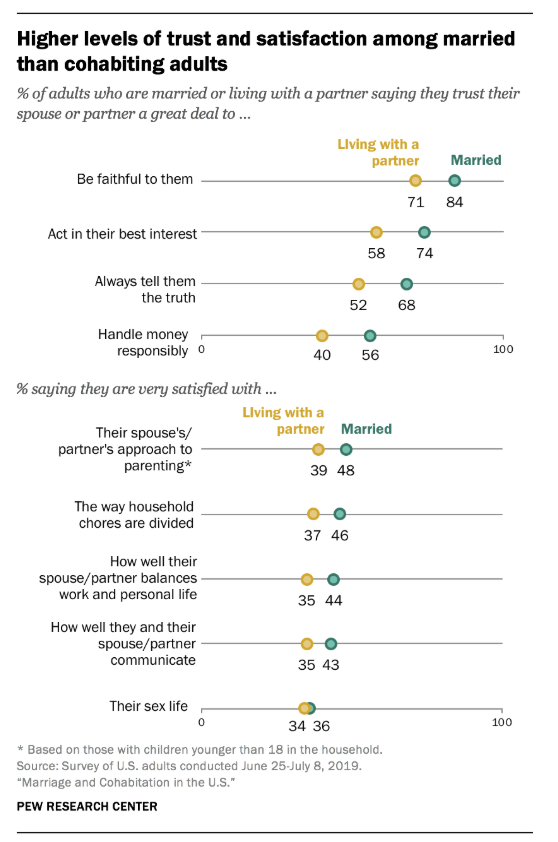
Social science data has shown for years that marriage is beneficial, both physically and mentally for men and women.
“Robust literature links being married to better physical and mental health outcomes,” a 2022 study published in the Journal of Family Psychology explains. “Studies consistently show long-term rather than short-term benefits to well being of getting married.”
A new joint study from the University of Michigan and Singapore Management University examined 5,000 adults in the United States and Japan. They found that “single adults in both cultures … reported worse physical health and lower life satisfaction than their married counterparts.”
While the study did not directly examine cohabiting couples, one of the lead authors explains, “My sense is that partnered but not married people would fall somewhere in between,” adding, “They get the benefits of partnership, in terms of social capital, support and companionship, but they might still not get the benefit … that comes with marriage.”
Decades of research have consistently shown the problems of cohabitation and serious dating relationships; neither come close to providing the same benefits as marriage when it comes to men and women’s overall well being.
Marriage Still Matters
Data consistently shows suicides are dramatically lower among married men and women. This is the case even though deaths of despair, or deaths from suicide, drug overdoses and alcohol abuse, have increased dramatically.
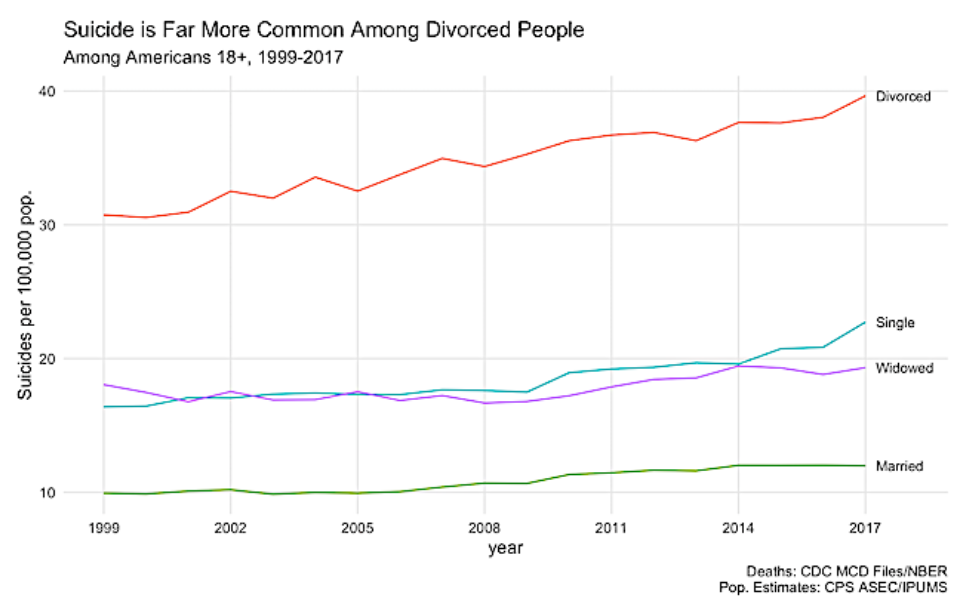
Why?
A 2025 University of Chicago study found that married people consistently are more likely to report substantially higher levels of happiness. Such findings have been consistent for decades.
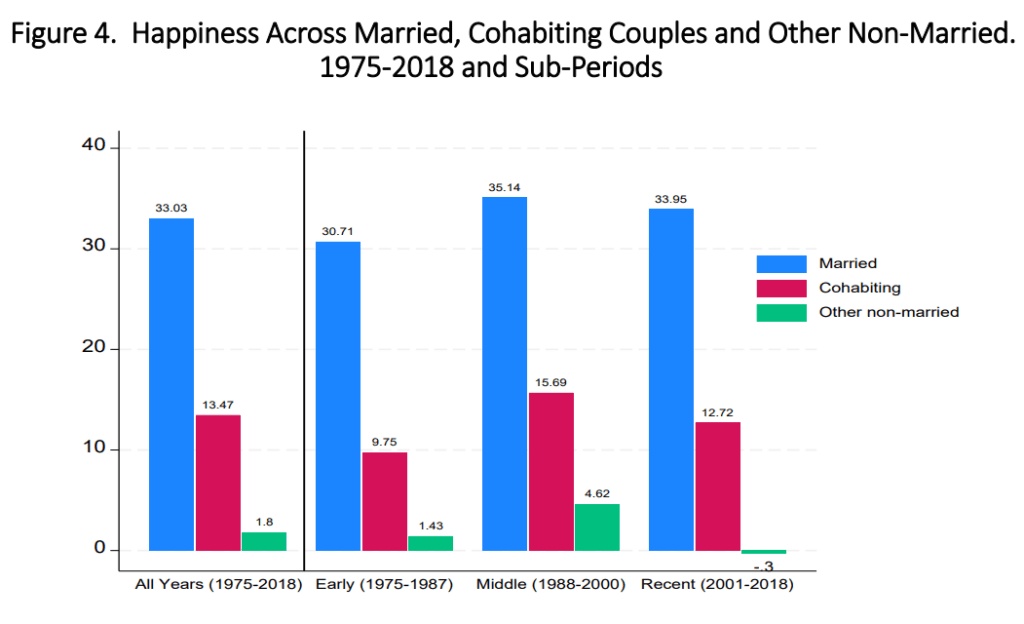
Married women tend to report being happier, compared to their husbands – who are significantly happier than their non-married counterparts. Both husbands and wives are substantially happier than their cohabiting and single peers.
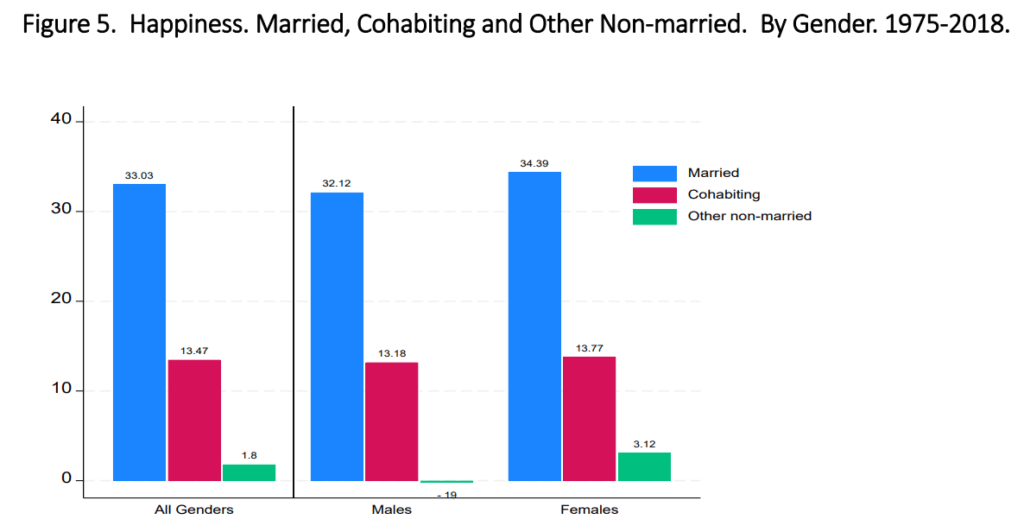
Professor Sam Peltzman, who conducted the study, explains the marriage premium for happiness is even more powerful than earning a desirable income.
Additionally, there are two main reasons why married people are happier. According to Pelzmen, happy people are more likely to get married and marriage in and of itself causes couples to be happier.
He notes, “Being married is the most important differentiator with a 30-percentage point happy-unhappy gap over the unmarried.”
Data from the Institute for Family Studies consistently shows this; married mothers are happier than their unmarried and childless peers by wide margins.
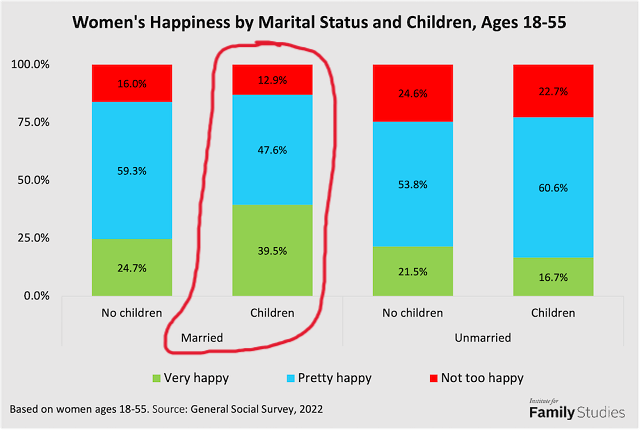
University of Virginia sociologist Brad Wilcox explains a happiness premium also holds true for married fathers.
“Nearly 60 percent of married fathers report their lives are meaningful ‘most of the time,’ compared to only 38 percent of their single childless peers,” he said.
Improved Physical Health
Marriage also positively impacts physical health, both for men and women.
A 2023 meta analysis looking at cancer survival rates, looked at how much marital status impacted a patient’s recovery, finding, “compared to unmarried patients, being married was significantly associated with better overall survival and cancer specific survival.” Additionally, the “most vulnerable group found in our study were divorced/separated men.”
Tyler VanderWeele, a medical professor of biostatistics at Harvard, carefully examined life factors that promote human flourishing.
He explains in the Proceedings of the National Academy of Sciences, “The effects of family life, and of marriage, are profound.”
He adds, “Evidence moreover suggests that marriage is associated with better mental health, physical health, and longevity, even controlling for baseline health, meaning that marriage promotes better health, rather than healthy people being selected into marriage.
“The effects of marriage on health, happiness and life satisfaction, meaning and purpose, character and virtue, close social relationships, and financial stability are thus profound,” Vanderweele continues in his findings.
In a different study, Harvard Medical School found in 2019 that marriage significantly boosts heart health and longevity in men.
They also found married individuals survived cancer by up to 5.75 years, compared with divorced peers and those never married (four years). Earlier research highlighted by Harvard explains the various ways marriage boosts physical health outcomes.
Improved Mental Health
Not only is marital status related to better mental health, but “marriage seems to confer its mental health benefits indiscriminately; that is … [married men and women are] better off from a mental health perspective relative to their unmarried peers,” according to the Institute for Family Studies in 2024.
IFS notes, “Specifically, being married is significantly correlated with better mental health among men and women, young and old, rich and poor, uneducated and educated, religious and secular, white and non-white, liberal and conservative and parents and those without children.”
A 2024 examination between depression and marital status across seven diverse countries “revealed that unmarried individuals had a higher risk of depressive symptoms than their married counterparts across all countries.” A 2025 study found older “married individuals were significantly less likely to report depressive symptoms” compared to their single, divorced or widowed peers.
Decades of Research
Decades of academic research shows just how marriage boosts physical health and mental well being for both women and men.
Walter R. Gove, a Vanderbilt University medical sociologist, started chronicling the health benefits of marriage in the early 1970s.
“It is shown that, controlling for age, the married have lower mortality rates than the single, the widowed, or the divorced” and “these differences are particularly marked among those types of mortality where one’s psychological state would appear to affect one’s life chances,” he said at the time.
Professor Robert H. Coombs from UCLA’s School of Medicine published similar findings in 1991.
Citing more than 130 studies on this connection, Coombs concluded, “There is an intimate link between marital status and personal well-being.”
“Numerous investigations beginning decades ago attest that married people live longer and generally are more emotionally and physically healthy than the unmarried,” he notes.
Linda J. Waite, a social demographer from the University of Chicago, similarly came to the conclusion in 1995 that marriage does matter for both men and women, simply because marriage leads to more healthy behaviors.
“Married men and women exhibit lower levels of negative health behaviors than the unmarried. Perhaps as a result, a good deal of research evidence suggests that married men and women face lower risks of dying at any point than those who have never been married or whose previous marriage has ended,” Waite explained.
Waite was tasked with the question of how marriage reduces the risk of dying.
First, it reduces risky, unhealthy behaviors.
Second, it increases wealth and material well being, meaning that married couples typically have good living conditions, healthier food and better access to medical care.
Finally, marriage provides a larger network of support and encouragement through children and extended family.
Marriage is a strong factor for great good in the lives of men and woman. This is why it’s a shame that marriage rates are declining, while cohabitation is climbing and divorce, while declining, remains at a very high level.
We are increasingly cutting ourselves off from a vital institution that dramatically boosts all important measures of well-being. That is simply not wise.
Related Articles and Resources
Are Men or Women More Likely to Be Married?
New Research Shows Married Families Matter More Than Ever
Why You Should Care About the Growing Positive Power of Marriage
Important New Research on How Married Parents Improve Child Well-Being
New Research: Marriage Still Provides Major Happiness Premium
Cohabitation Still Harmful – Even as Stigma Disappears
Don’t Believe the Modern Myth. Marriage Remains Good for Women
Don’t Believe the Modern Myth. Marriage Remains Good for Men.
Yes, Married Mothers Really Are Happier Than Unmarried and Childless Women
Marriage and the Public Good: A New Manifesto of Policy Proposals
Image from Shutterstock.











